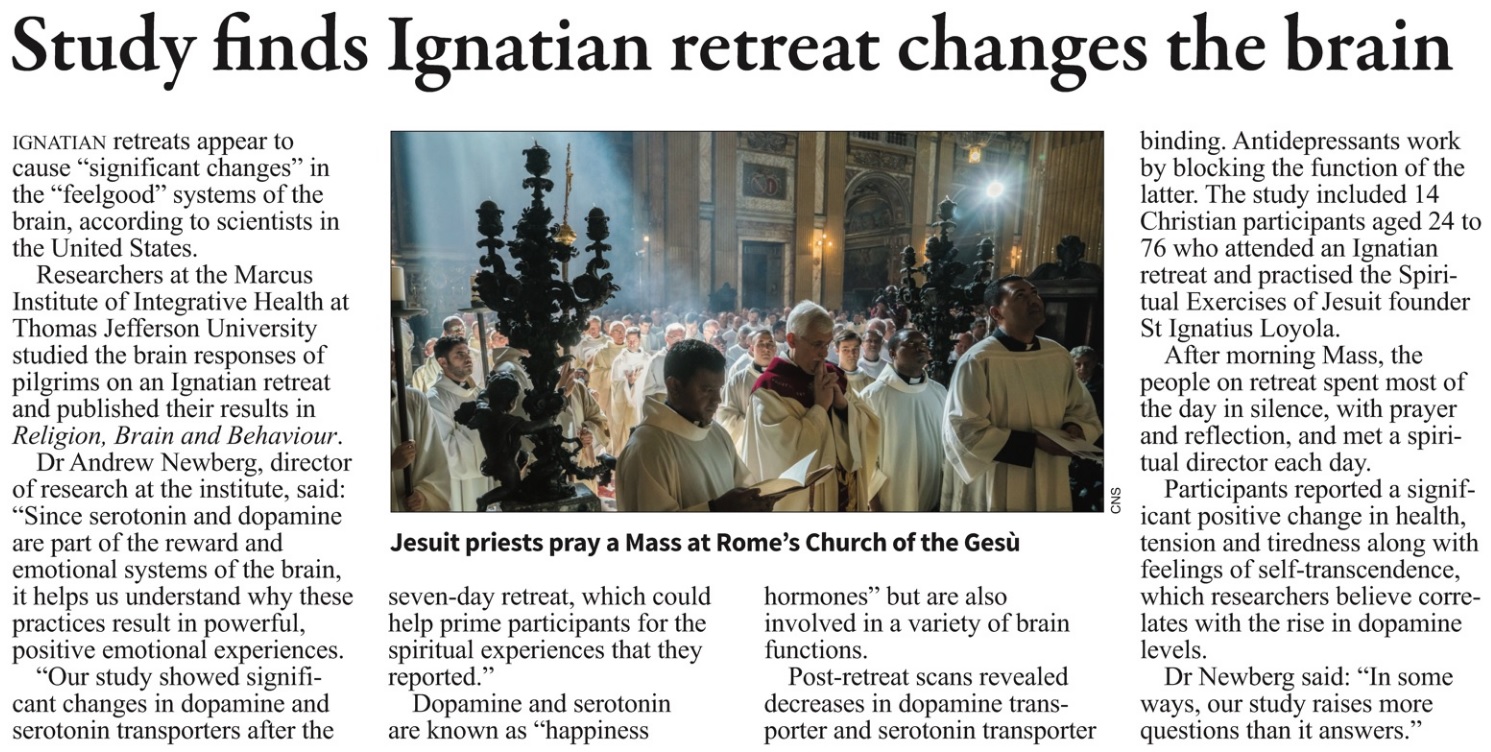UPDATE 1 April:
I’ve been thinking about this story in light of some current trends in the MSM (mainstream media).
What if….
What if zombies were to eat Jesuit brains? Would they, too, have significant positive changes? I can’t imagine that. Can anything positive come from eating Jesuit brains? However, once some Jesuits had had their brains eaten, they too would become zombies! But, and here’s the rub, they wouldn’t have their positive Ignatian retreat brains anymore! Right? So, I suppose if they were merely bitten by zombies, and they retained their brains, then they might be happier zombies and wouldn’t need to lurch around looking for intracranial repasts. They would probably just continue to teach in their schools, write in their publications and, in effect, carry on as before.
____ Originally Published on: Mar 31, 2017
My first reaction after my first glance would be, “That explains a lot.”
Some wag might rewrite this, taking a cue from just the headline.

I’ll tell you what changes my brain: Mystic Monk Coffee in my Clement XIV Papa Ganganelli mug!


For all the selections click
>HERE<<
Mystic Monk Coffee! It’s swell!
Did I mention that Pope Clement suppressed the Jesuits?
Oh, yes… the story is in this week’s print edition of The Catholic Herald, the UK’s best Catholic weekly.
Meanwhile, don’t miss Sandro Magister’s piece today about the theological memorandum sent to the Holy Father about the antics of the present General of the aforementioned Jesuits. HERE The General, Arturo Sosa Abascal, SJ, uttered some incredible comments a while back which, if taken on face value, gut Christianity of an essential characteristic: Christ.


































The subject of the news article, The Spiritual Exercises of St. Ignatius Loyola, have a long and honored tradition in the Church. They were approved by the Holy Office in 1548 and first endorsed and recommended to all Catholics as a means of growth in their faith by the then reigning Pope, Paul III. Retreats for non-Jesuit religious and also the laity using The Exrecises were common in the Church prior to the Second Vatican Council.
I’ve not been on an Ignatian retreat yet.
Until then, I will continue to drink Mystic Monk coffee. I love their coffee of the month plan!
I know some very good (actually excellent) Jesuits. Maybe they drink Mystic Monk, too!
Fortunately, the Monty Python Office of the Spanish Inquisition (MPOSI) has already tendered a definitive opinion on the treatment for Jesuit brains:
Jesuit: My brain hurts!
MPOSI Surgeon: Well, let’s take a look at it Rev. Gumby! Oh, it will have to come out!
Jesuit: Out? Out of my head?
MPOSI Surgeon: Yes, only bits of it.
Apologies for spoofing this spoof. The person responsible has been sacked.
The Sandro Magister’s piece seems quite interesting and insightful. I should very much like to see His Holiness’ response to it… Except that our experience, as a people, is that His Holiness does not respond publicly to challenges such as this. I have come to doubt that he responds privately either. That is a fascinating reality, all on its own, for it seems to directly challenge the primacy of the Chair of St. Peter for, if the Pope does not exist to bring unity and clarity to issues in dispute between the bishops, are not our Orthodox brethren right?
As a child of the JPII era, I have long held in high esteem the Papacy, believing that the Vatican was the final arbiter of all disputes on issues of faith and morals. I have long taken the Vatican’s position on even those issues that are up for careful consideration, like the death penalty and economic justice, quite seriously because of the line between Peter and the Pope. So, what are we to do with all of that?
If the Pope prefers uncertainty and provincialism on matters that were, heretofore, solid and not in dispute, it must be that that which has never been spoken definitely on has even less of a footing.
I conclude that a failure to affirm that which was not in dispute makes that which WAS in dispute, purely a matter of perspective and that cuts far too close a relativistic line for my comfort.
14 subjects is not statistically significant. At best, this is a pilot study. What the heck is self-transcendence? Feeding and clothing the poor is self-transcndence. I have no idea what the article means by that term. We had this same situation occur in humor studies. One researcher did real-time monitoring of dopamine levels, indirectly, since he couldn’t, easily, measure brain dopamine (although, with modern biochemical tagging, this might be possible) and endorphins – likewise, using proxy blood compounds. He found that watching a funny movie raised the level of endorphins in the brain. His study has been cited many times and may have helped convince some medical schools to offer medical humor electives. The catch? His study only had five subjects. Real-time bold analysis in the 1980’s was really expensive. It was a nice pilot study, but it was way over-sold in the media. I have no problem with reporting the results in the media, as long as they don’t sell it for what it is not. It is not conclusive science. It is a pilot study.
Okay, the actual paper may be found, here. It is titled: Effect of a one-week spiritual retreat on dopamine and serotonin transporter binding: a preliminary study, Andrew B. Newberg, Nancy Wintering, David B. Yaden, Li Zhong, Brendan Bowen, Noah Averick , Daniel A. Monti, Religion, Brain, and Behavior, Pages 1-14 | Received 12 Jun 2016, Accepted 26 Nov 2016, Published online: 22 Mar 2017.
They used a radioactive iodine tag to measure dopamine and serotonin in five different regions of the brain. I would have liked to see a second baseline for each person a month apart and I would like to have seen them suggest other ways these results might have been obtained – other behaviors that might have done this. Everybody has a high after a retreat. They, in no way, distinguish this natural state from anything truly supernatural. Do people who attend the New Agey, Pop Psych, week-long seminars show similar results or is this specific to religion? Does the general command – “Listen to The Spirit,” produce these changes and, since the Holy Spirit is not at our neck-and-call to show Himself, how can we say these results are not from over-use of the imagination, in general, as opposed to a genuine encounter with Transcendance? This is an interesting pilot study, but there is a long way from this to showing any permanent changes in the brain specific to the Ignatian method (or the slimmed-down, seven day version used, here). They should have measured the changes not simply after a week (way too short, in my opinion), but also, after a month and after a year. Otherwise, there can be no claim of permanence, merely a claim of a reactive change.
The Chicken
Should read:
“Real-time blood analysis in the 1980’s was really expensive.”
That was, probably, an iPad mistake.
” Does the general command – “Listen to The Spirit,” produce these changes and, since the Holy Spirit is not at our beck-and-call to show Himself, how can we say these results are not from over-use of the imagination, in general, as opposed to a genuine encounter with Transcendence?”
Those, are on me.
The Chicken
Poor Yorek: “And now for something completely different” :)
“The General, Arturo Sosa Abascal, SJ, uttered some incredible comments a while back which, if taken on face value, gut Christianity of an essential characteristic: Christ.”
Shocked. Shocked!
By the way, is there any other institution on the face of the earth that harbors, clothes, and feeds so many individuals who swore their allegiance to it but then spend their lives publicly undercutting it?
This is not tolerated in the corporate world. In the far more important spiritual realm, why is this tolerated?
I did a one week silent Ignatian retreat and it was one of the most exhausting things I have ever done in my life, spiritually fruitful in some respects, but also difficult in others. I would say careful discernment should be given to the question if a particular person is spiritually and psychologically in a well prepared state before making such a retreat.
Dear Thomistica,
according to something I picked up somewhere, I would say: But then in the corporate world, we know that truth is “always in the middle”, and each side must fight for to get the largest share of the pie.
Not so in the Church; it really is a simple “we’re right, they’re wrong” here.
And as it is Truth we defend, we know that every search for truth which is not actually traitorous can in the very large view only contribute to finding it, that is, the real ones.
Hence to quote Dagobert Duck, while all of the stricter orders mean to take part in the Church as out-toughing the toughies, the Jesuits among others mean to take part in the Church out-smarting the smarties.
Then, the Jesuits have their concept of obedience; which means obedience of the inferior to the superior and, I am told, also vice versa; and which consists in sacrificing one’s own moral estimate in the security that God works it all out for the best.
In this case, the thought may be phrased thus: “A lot of questions apparently against the Catholic faith may appear; but let them appear from faithful Catholics first. A lot of tries to answer may appear, some of them treading on new territory, some of them even walking the border that separates us from material heresy; but let all of them appear from faithful Catholics, and finely sure of formal heresy. A lot of attempts at reform of rites, reform of manners, reform of moral may come forth, but let all of them come forth from faithful Catholics.”
The idea has its charms (as one approach among others); but there’s no denying there is a very slippery slope around, especially if the Magisterium from above-at-the-real-top is not quick to censure. That it would stand at the ready for censuring, ensuring the liberty of the Jesuit order to go safely in all directions because someone will eventually stop them if necessary, seems to have been the underlying Jesuit assumption through the centuries.
Imrahil: “…because someone will eventually stop them if necessary,…”
Pope Clement XIV,for example. These days… not so much.
Yes, but while jokes may all well be fine, and while it is well possible that there was an actual sort of haughtiness present in Jesuits which may have led people to display what Chesterton might have called the genuinely Christian (albeit not saintly) pleasure of schadenfreude (I am told this is an English word…), als our reverend host once told about the Gregoriana students whose professors were Jesuits,
still when actually speaking seriously, we should not read a criticism focused entirely on the post-Vatican II order into the 18th century.
The suppression of the Jesuits, joking set aside, was the result of political blackmail and defensible, if at all, only under an ad maiora mala vitanda principle. Which is evident, if for no other reason, in that Pope Clement in his bull explicitly stressed the point that he can suppress even an institute not proven guilty.
Imrahil says: You insist on killing the joy of Jesuit suppression and dragging this down into the muck of 18th c. politics!
And, yes, schadenfreude really is a word in English.
Imrahil,
Re. “we know that every search for truth which is not actually traitorous can in the very large view only contribute to finding it, that is, the real ones”–that really is the crux of the critique of the current-day Jesuits.
There are very many priests in their ranks who are “traitorous” in wanting to undermine the received magisterium.
I take the point that there needs to be healthy debate about truly unsettled issues, e.g. about arcane disputes in bioethics or in ethics as it pertains to economics or policy related disputes about new toys of war, just for example. But obsessive, never-ending debate about issues settled very long ago in the magisterium, this constant revisiting of the very foundations? That’s something entirely different.
It’s time for the Jesuit order to disband if it cannot refocus. Barring a miracle, the necessary radical overhaul ain’t going to happen. The order is just riding on a vague after-glow reputation acquired from a much earlier storied tradition of intellectual prowess, evangelization and martyrdom. The few really sound priests in their order can join an another order if they can’t effect this overhaul.
An aside: I was not giving a personal opinion (other than the brief “has its charms as one way besides others”), but merely describing an idea that could possibly be an “idea behind” this classically (i. e.: described pre-Vatican II) perceived Jesuit paradox of strictest obedience coupled with incredibly large liberty. Which could have been why I both heat that the likes of Voltaire decried the loss of the Jesuit schools, and why I think I’ve also read once about the Jesuits echoing Brüning (ante personam) that they’ve been fouled ten meters before the finishing line.
I assume you’ll agree that if this indeed what drove the paradox, in the last few generations it has shown its instability. No surprises there–if it’s a correct characterization, it was, after all, a paradox.
Would someone study the effect that listening to music by the St. Louis Jesuits has on the brain? It can’t be good.
Be not afraid…
[Ooooo… No. be afraid. Be very afraid.]